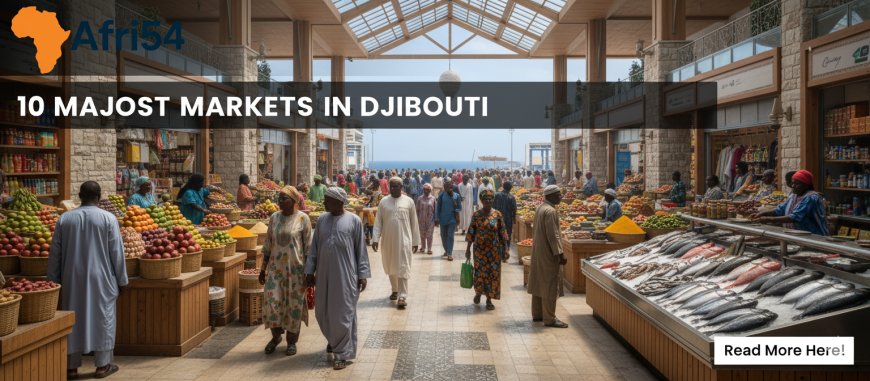10 Major Markets in Djibouti: A Crossroads of East African Trade
Explore the 10 major markets in Djibouti, from the bustling Marché Central in Djibouti City to regional hubs and specialized souks. Discover fresh seafood, exotic spices, and the vibrant cross-cultural trade at this East African crossroads.

Djibouti, a small yet strategically vital nation located at the crossroads of East Africa and the Arabian Peninsula, boasts a unique commercial landscape shaped by its port, its diverse population, and its role as a regional trade hub. While not as sprawling as some larger African nations, Djibouti's markets are vibrant and essential, reflecting its multicultural influences and its position as a gateway for goods. These markets are dynamic centers where the heart of Djiboutian life beats, offering a blend of local traditions and international commerce.
The markets in Djibouti are characterized by their bustling atmosphere, the diverse array of products from across the globe, and their role as essential social and economic gathering places. Here, you can find everything from fresh seafood and exotic spices to traditional clothing, electronics, and goods imported from Asia, Europe, and neighboring African countries. They are not just places for transactions but also for cultural exchange and daily social interaction.
Let's delve into 10 of the major markets that play a significant role in the commercial landscape and daily lives across Djibouti:
1. Marché Central (Central Market, Djibouti City)
The undisputed heart of commerce in Djibouti City, the Marché Central is a bustling, vibrant hub. It's a sprawling complex where you can find almost anything: fresh produce, meat, fish, aromatic spices (especially frankincense and myrrh), traditional clothing, textiles, household goods, and electronics. It's a true reflection of Djibouti's role as a melting pot of cultures and trade.
2. Marché de la Gare (Train Station Market, Djibouti City)
Located near the historic train station, this market serves as another significant commercial artery in the capital. It's particularly known for its diverse food offerings, including fresh fruits, vegetables, and local delicacies. Its proximity to a transport hub makes it easily accessible for both vendors and shoppers.
3. Marché de Quartier 7 (Djibouti City)
Quartier 7 is a populous district in Djibouti City, and its market is essential for daily provisions for the local community. It offers a wide range of fresh food items, groceries, and everyday necessities, playing a crucial role in the social and economic fabric of the neighborhood.
4. Marché de Balbala (Djibouti City)
Balbala is a large and growing suburb of Djibouti City, and its market serves a significant portion of the urban population. It's a vital commercial center for fresh produce, affordable household goods, and clothing, reflecting the diverse needs of its residents.
5. Fish Market (Djibouti City)
Given Djibouti's coastal location on the Gulf of Aden, the Fish Market is a crucial and lively part of its economy. Each morning, local fishermen bring in their fresh catches, offering a wide variety of seafood, including tuna, snapper, barracuda, and often lobster or crab. It’s a sensory experience and a must-visit for seafood lovers.
6. Gold Souk (Djibouti City)
While not a general market for everyday goods, Djibouti City's Gold Souk (often integrated within or near the Marché Central area) is a major commercial point for jewelry and precious metals. It attracts buyers and sellers interested in traditional and modern gold and silver pieces, reflecting the regional demand for such items.
7. Salt Market (Djibouti City)
The Salt Market (or areas where salt is specifically traded) highlights one of Djibouti's historical resources: salt extracted from Lake Assal. While not a typical daily market, large quantities of salt are traded here, packaged for local use or export, showcasing a unique aspect of Djiboutian commerce.
8. Marché de Tadjourah (Tadjourah)
Tadjourah, one of Djibouti's oldest towns and a historic port, has a local market that serves the region. It's an important hub for local produce, fresh fish from the Gulf, and goods distributed to the northern part of the country. It offers a glimpse into regional trade outside the capital.
9. Marché d'Ali Sabieh (Ali Sabieh)
Located in the southern region of Djibouti, Ali Sabieh's market is a key commercial center for its province. It facilitates trade of local agricultural products, livestock, and goods that sometimes flow across the nearby borders with Ethiopia and Somalia, reflecting its strategic inland position.
10. Marché de Dikhil (Dikhil)
Dikhil is another important regional town, and its market serves the local population and surrounding rural areas. It's essential for food supplies, livestock, and basic household items, providing a vital economic and social meeting point for the Dikhil region.
Have you listed your business on Afri54?
Afri54 exists to solve a fundamental challenge faced by millions of African businesses: lack of visibility. Whether you're an automobile part seller in Lagos, a local attire manufacturer in Kigali, a coffee exporter in Addis Ababa, or a mobile phone supplier in Accra, you deserve to be seen. Join now






















